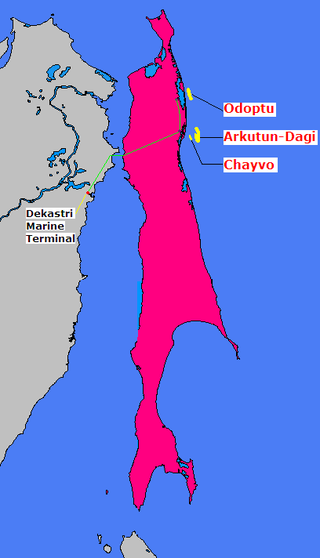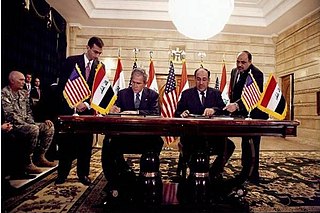
The Exxon Valdez oil spill was a major environmental disaster that occurred in Alaska's Prince William Sound on March 24, 1989. The spill occurred when Exxon Valdez, an oil supertanker owned by Exxon Shipping Company, bound for Long Beach, California, struck Prince William Sound's Bligh Reef, 6 mi (9.7 km) west of Tatitlek, Alaska at 12:04 a.m. The tanker spilled more than 10 million US gallons (240,000 bbl) of crude oil over the next few days.

Esso is a trading name for ExxonMobil. Originally, the name was primarily used by its predecessor Standard Oil of New Jersey after the breakup of the original Standard Oil company in 1911. The company adopted the name "Esso", to which the other Standard Oil companies would later object.

A safety-critical system or life-critical system is a system whose failure or malfunction may result in one of the following outcomes:

The Sakhalin-I project, a sister project to Sakhalin-II, is a consortium for production of oil and gas on Sakhalin Island and immediately offshore. It operates three fields in the Okhotsk Sea: Chayvo, Odoptu, and Arkutun-Dagi.

SpaceGodzilla is a kaiju and mutated clone of Godzilla that first appeared in Toho's 1994 film Godzilla vs. SpaceGodzilla as the main antagonist.

Rex Wayne Tillerson is an American energy executive who served as the 69th United States secretary of state from 2017 to 2018 in the first administration of Donald Trump. From 2006 to 2016, he was chairman and chief executive officer (CEO) of ExxonMobil.
Agonism is a political and social theory that emphasizes the potentially positive aspects of certain forms of conflict. It accepts a permanent place for such conflict in the political sphere, but seeks to show how individuals might accept and channel this conflict positively. Agonists are especially concerned with debates about democracy, and the role that conflict plays in different conceptions of it. The agonistic tradition to democracy is often referred to as agonistic pluralism. A related political concept is that of countervailing power. Beyond the realm of the political, agonistic frameworks have similarly been utilized in broader cultural critiques of hegemony and domination, as well as in literary and science fiction.

Big Oil is a name sometimes used to describe the world's six or seven largest publicly traded and investor-owned oil and gas companies, also known as supermajors. The term, particularly in the United States, emphasizes their economic power and influence on politics. Big Oil is often associated with the fossil fuels lobby and also used to refer to the industry as a whole in a pejorative or derogatory manner.

The Kearl Oil Sands Project is an oil sands mine in the Athabasca Oil Sands region at the Kearl Lake area, about 70 kilometres (43 mi) north of Fort McMurray in Alberta, Canada that is operated by the 143-year old Calgary, Alberta-headquartered Imperial Oil Limited—one of the largest integrated oil companies in Canada. Kearl is owned by Imperial Oil and is controlled by Imperial's parent company, ExxonMobil—an American multinational that is one of the largest in the world.

The fossil fuels lobby includes paid representatives of corporations involved in the fossil fuel industry, as well as related industries like chemicals, plastics, aviation and other transportation. Because of their wealth and the importance of energy, transport and chemical industries to local, national and international economies, these lobbies have the capacity and money to attempt to have outsized influence on governmental policy. In particular, the lobbies have been known to obstruct policy related to environmental protection, environmental health and climate action.

Exxon Mobil Corporation is an American multinational oil and gas corporation headquartered in Spring, Texas, a suburb of Houston. Founded as the largest direct successor of John D. Rockefeller's Standard Oil, the modern company was formed in 1999 following the merger of Exxon and Mobil. It is vertically integrated across the entire oil and gas industry, and within it is also a chemicals division which produces plastic, synthetic rubber, and other chemical products. As the largest U.S.-based oil and gas company, ExxonMobil is the seventh-largest by revenue in the U.S. and 13th-largest in the world. It is the largest investor-owned oil company in the world. Approximately 55.56% of the company's shares are held by institutions, the largest of which as of 2019 were The Vanguard Group (8.15%), BlackRock (6.61%), and State Street Corporation (4.83%).

Critical making refers to the hands-on productive activities that link digital technologies to society. It was invented to bridge the gap between creative, physical, and conceptual exploration. The purpose of critical making resides in the learning extracted from the process of making rather than the experience derived from the finished output. The term "critical making" was popularized by Matt Ratto, an associate professor at the University of Toronto. Ratto describes one of the main goals of critical making as a way "to use material forms of engagement with technologies to supplement and extend critical reflection and, in doing so, to reconnect our lived experiences with technologies to social and conceptual critique." "Critical making", as defined by practitioners like Matt Ratto and Stephen Hockema, "is an elision of two typically disconnected modes of engagement in the world — "critical thinking," often considered as abstract, explicit, linguistically based, internal and cognitively individualistic; and "making," typically understood as tacit, embodied, external, and community-oriented."

Spare Parts is a 2015 biographical drama film directed by Sean McNamara and produced by David Alpert, Rick Jacobs, Leslie Kolins Small, George Lopez, and Ben Odell. It is based on the Wired magazine article "La Vida Robot" by Joshua Davis, about the true story of a group of students from a mainly Latino high school, who won first place over M.I.T. in the 2004 MATE ROV competition. The film was released by Lions Gate Entertainment on January 16, 2015.

As the world's largest majority investor-owned oil and gas corporation, ExxonMobil has received significant amounts of controversy and criticism, mostly due to its activities which increase the speed of climate change and its denial of global warming.

Ali Khedery is an American entrepreneur and a Fellow at the Massachusetts Institute of Technology. Before serving as an executive at ExxonMobil and the Abu Dhabi National Oil Company, he was the longest continuously serving American official in Iraq, from 2003 to 2009, and acted as a special assistant to five U.S. ambassadors and as a senior adviser to three heads of U.S. Central Command.
Design fiction is a design practice aiming at exploring and criticising possible futures by creating speculative, and often provocative, scenarios narrated through designed artifacts. It is a way to facilitate and foster debates, as explained by futurist Scott Smith: "... design fiction as a communication and social object creates interactions and dialogues around futures that were missing before. It helps make it real enough for people that you can have a meaningful conversation with".

The Trabocchi Coast, which corresponds to the coastal stretch Adriatic of province of Chieti (Abruzzo), is a 70-kilometer coast from Ortona to San Salvo, in Italy. It comprises a number of coves and reefs below the hills that end at the Adriatic Sea marked by the spread of Trabucco – fishing machines on piles. Many of the towns on the Coast maintain their own characteristics and traditions.

From the 1980s to mid 2000s, ExxonMobil was a leader in climate change denial, opposing regulations to curtail global warming. For example, ExxonMobil was a significant influence in preventing ratification of the Kyoto Protocol by the United States. ExxonMobil funded organizations critical of the Kyoto Protocol and seeking to undermine public opinion about the scientific consensus that global warming is caused by the burning of fossil fuels. Of the major oil corporations, ExxonMobil has been the most active in the debate surrounding climate change. According to a 2007 analysis by the Union of Concerned Scientists, the company used many of the same strategies, tactics, organizations, and personnel the tobacco industry used in its denials of the link between lung cancer and smoking.
Matthew Kenyon is an American new media artist and director of the art practice, S.W.A.M.P.. Kenyon focuses on critical themes addressing global corporate operations, mass media, military-industrial complexes, and the liminal area between reality and artificial life.
ExxonMobil, an American multinational oil and gas corporation presently based out of Texas, has had one of the longest histories of any company in its industry. A direct descendant of John D. Rockefeller's Standard Oil, the company traces its roots as far back as 1866 to the founding of the Vacuum Oil Company, which would become part of ExxonMobil through its own merger with Mobil during the 1930s. The present name of the company comes from a 1999 merger of Standard Oil's New Jersey and New York successors, which adopted the names Exxon and Mobil respectively throughout the middle of the 20th century. Because of Standard Oil of New Jersey's ownership over all Standard Oil assets at the time of the 1911 breakup, ExxonMobil is seen by some as the definitive continuation of Standard Oil today.















